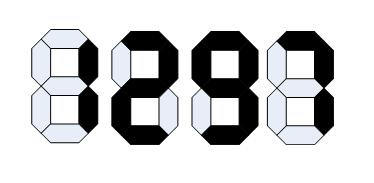# 颠倒的价牌
小李的店里专卖其它店中下架的样品电视机,可称为:样品电视专卖店。
其标价都是4位数字(即千元不等)。
小李为了标价清晰、方便,使用了预制的类似数码管的标价签,只要用颜色笔涂数字就可以了(参见图片)。

这种价牌有个特点,对一些数字,倒过来看也是合理的数字。如:1 2 5 6 8 9 0 都可以。这样一来,如果牌子挂倒了,有可能完全变成了另一个价格,比如:1958 倒着挂就是:8561,差了几千元啊!!
当然,多数情况不能倒读,比如,1110 就不能倒过来,因为0不能作为开始数字。
有一天,悲剧终于发生了。某个店员不小心把店里的某两个价格牌给挂倒了。并且这两个价格牌的电视机都卖出去了!
庆幸的是价格出入不大,其中一个价牌赔了2百多,另一个价牌却赚了8百多,综合起来,反而多赚了558元。
请根据这些信息计算:赔钱的那个价牌正确的价格应该是多少?
下面的哪一项是错误的?
## aop
### before
```c
#include
using namespace std;
```
### after
```c
```
## 答案
```c
int main()
{
int num1[7] = {0, 1, 2, 5, 6, 8, 9};
int num2[7] = {0, 1, 2, 5, 9, 8, 6};
int profit1[1111][2];
int profit2[1111][2];
int before_reverse;
int after_reverse;
int i = 0;
int j = 0;
for (int a = 1; a < 7; a++)
{
for (int b = 0; b < 7; b++)
{
for (int c = 0; c < 7; c++)
{
for (int d = 0; d < 7; d++)
{
before_reverse = num1[a] * 1000 + num1[b] * 100 + num1[c] * 10 + num1[d];
after_reverse = num2[d] * 1000 + num2[c] * 100 + num2[b] * 10 + num2[a];
if (after_reverse - before_reverse > -300 && after_reverse - before_reverse < -200)
{
profit1[i][0] = before_reverse;
profit1[i][1] = after_reverse - before_reverse;
i++;
}
else if (after_reverse - before_reverse > 800 && after_reverse - before_reverse < 900)
{
profit1[j][0] = after_reverse - before_reverse;
profit2[j][1] = before_reverse;
j++;
}
}
}
}
}
int answer = 0;
for (int a = 0; a < i; a++)
{
for (int b = 0; b < j; b++)
{
if (profit1[a][1] + profit2[b][1] == 558)
{
answer = profit1[a][0];
}
}
}
cout << answer << endl;
return 0;
}
```
## 选项
### A
```c
void i2s(int num, string &str)
{
stringstream ss;
ss << num;
ss >> str;
}
void s2i(string &str, int &num)
{
stringstream ss;
ss << str;
ss >> num;
}
char to(char x)
{
if (x == '6')
return '9';
else if (x == '9')
return '6';
else
return x;
}
string reserve(const string &str)
{
string ans;
for (int i = 3; i >= 0; i--)
{
ans.insert(ans.end(), to(str[i]));
}
return ans;
}
struct price
{
int a, b, c;
};
vector v1;
vector v2;
int main()
{
int answer = 0;
for (int i = 1000; i < 10000; i++)
{
string str;
i2s(i, str);
if (str.find('3') != string::npos || str.find('4') != string::npos || str.find('7') != string::npos || str.rfind('0') == 3)
continue;
string r = reserve(str);
int r_int;
s2i(r, r_int);
int plus = r_int - i;
if (plus > -300 && plus < -200)
{
price p = {i, r_int, plus};
v1.push_back(p);
}
else if (plus > 800 && plus < 900)
{
price p = {i, r_int, plus};
v2.push_back(p);
}
for (int i = 0; i < v1.size(); i++)
{
for (int j = 0; j < v2.size(); j++)
{
if (v1[i].c + v2[j].c == 558)
{
answer = v1[i].a;
}
}
}
}
cout << answer;
return 0;
}
```
### B
```c
#define ll long long
using namespace std;
int flag(int n)
{
if (n % 10 == 0)
return 0;
while (n > 0)
{
int t = n % 10;
if (t == 3 || t == 4 || t == 7)
return 0;
n /= 10;
}
return 1;
}
int reverse(int n)
{
int ans = 0;
while (n > 0)
{
int t = n % 10;
if (t == 6)
t = 9;
else if (t == 9)
t = 6;
ans = ans * 10 + t;
n /= 10;
}
return ans;
}
int main()
{
int ans1, ans2;
for (int i = 1000; i <= 10000; i++)
{
for (int j = 1000; j <= 10000; j++)
{
if (flag(i) && flag(j))
{
int t1 = i - reverse(i);
int t2 = j - reverse(j);
if (t1 > 200 && t1 < 300 && t2 < -800 && t2 > -900 && t2 + t1 == -558)
{
ans1 = i, ans2 = j;
cout << ans1 << endl;
break;
}
}
}
}
return 0;
}
```
### C
```c
int num[] = {0, 1, 2, 3, 4, 5, 6, 7, 8, 9};
int dnum[] = {0, 1, 2, -1, -1, 5, 9, -1, 8, 6};
int main()
{
int a[10], b[10];
int answer = 0;
for (a[1] = 1; a[1] <= 9; ++a[1])
for (a[2] = 0; a[2] <= 9; ++a[2])
for (a[3] = 0; a[3] <= 9; ++a[3])
for (a[4] = 1; a[4] <= 9; ++a[4])
{
if (dnum[a[1]] >= 0 && dnum[a[2]] >= 0 && dnum[a[3]] >= 0 && dnum[a[3]] >= 0)
{
int x = a[1] * 1000 + a[2] * 100 + a[3] * 10 + a[4];
int y = dnum[a[4]] * 1000 + dnum[a[3]] * 100 + dnum[a[2]] * 10 + dnum[a[1]];
if (x - y >= 200 && x - y <= 300)
{
for (b[1] = 1; b[1] <= 9; ++b[1])
for (b[2] = 0; b[2] <= 9; ++b[2])
for (b[3] = 0; b[3] <= 9; ++b[3])
for (b[4] = 1; b[4] <= 9; ++b[4])
{
if (dnum[b[1]] >= 0 && dnum[b[2]] >= 0 && dnum[b[3]] >= 0 && dnum[b[3]] >= 0)
{
int i = b[1] * 1000 + b[2] * 100 + b[3] * 10 + b[4];
int j = dnum[b[4]] * 1000 + dnum[b[3]] * 100 + dnum[b[2]] * 10 + dnum[b[1]];
if (j - i >= 800 && j - i <= 900)
{
if (j - i + y - x == 558)
answer = x;
}
}
}
}
}
}
cout << answer;
return 0;
}
```